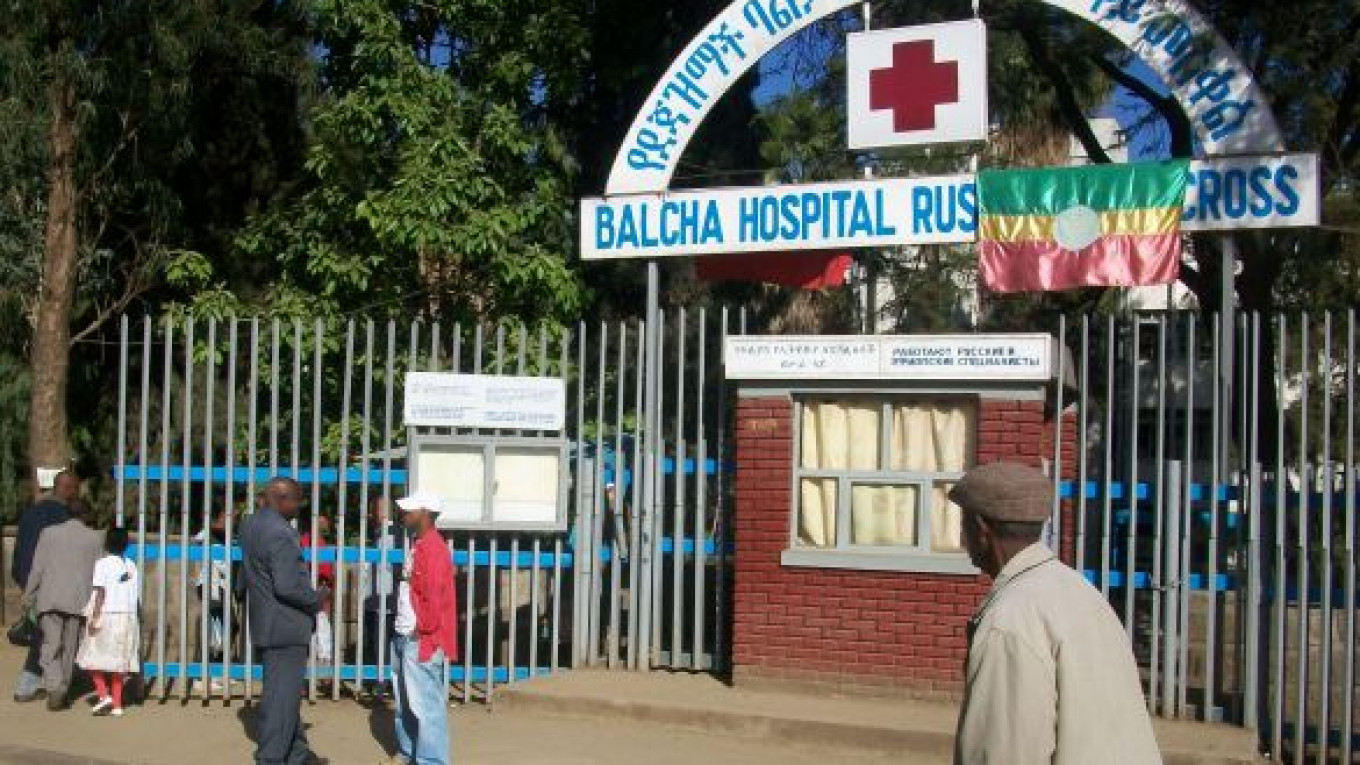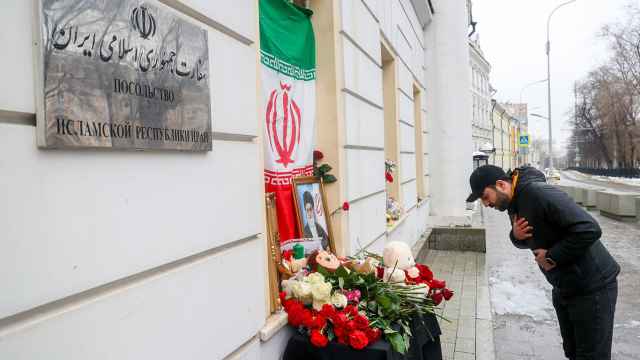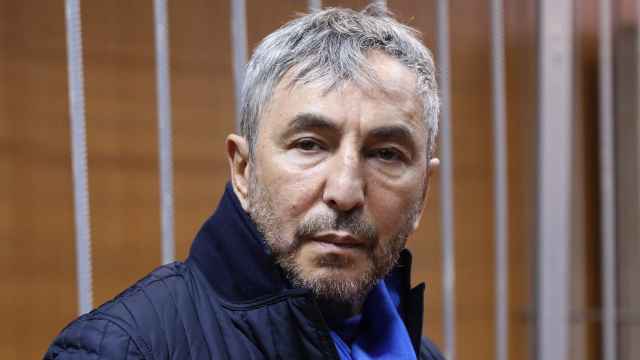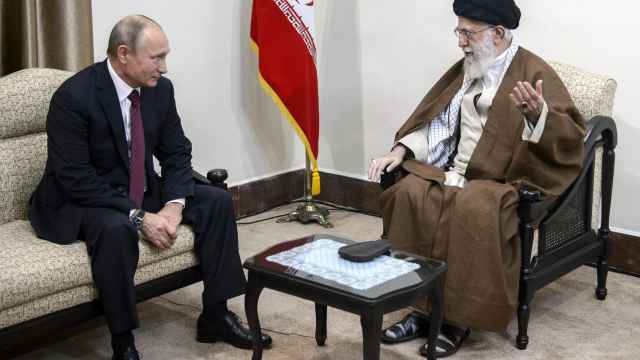ADDIS ABABA, Ethiopia — Mention Russia to Ethiopians and their first association is likely to be with medicine.
"We have Russian doctors at Dejazmach Balcha Hospital," said Melaku Tenew, a licensed guide in the historical city of Gondar. "I was there last month for my ankle. They are very good and so kind. Tell them if they come to Gondar, I will take care of them."
The message was easily delivered, 720 kilometers away in the capital Addis Ababa, where the hospital has been operating in an outer neighborhood of the city since 1947. It is the last Russian Red Cross outpost abroad, a remnant of a network that, in its Soviet heyday, included locales such as Pyongyang and Beijing.
Ethiopian attendants speaking polite, elementary Russian usher visitors through the entranceway in the high wall that surrounds the compound's large concrete-slab buildings.
Intake nurse Irina spoke fluent Russian — unsurprising for a native of the Kuzbass region of Siberia, but still somewhat astonishing in a city where Europeans of any kind are rare. She was one of the staff members who did not wish to give her last name or be photographed.
Irina shrugged off the exoticness as she described a close-knit community of 40 to 50 Russian doctors and nurses who live within the hospital compound, work six days a week and relax together at a lakeside outside the city.
"I wanted to go somewhere, see how others lived," she said. "I was so sure I needed it and wanted it that it wasn't scary at all." She has returned to Siberia only once in her four years working in Ethiopia, noting that it was a difficult trip.
"There have only been pluses," Irina said of the job, which she found through an acquaintance.
Internist Dr. Tatyana came to Balcha from Smolensk for "unusual personal reasons," and didn't regret it.
"I had no idea what was here," she said.
She moves freely about Addis Ababa on public transport with her nine-year-old daughter Miriam, one of seven children in the Balcha Russian community.
Miriam attends the Russian Embassy school, where she studies in a class of three. She plays with the gigantic turtles they keep on the hospital grounds and is the community's expert on the local mongoose population. But she doesn't remember snow.
The conversation with Dr. Tatyana was interrupted by a middle-aged man who, reenacting a set piece from Soviet cinema, rushed in unceremoniously demanding to know what was going on and why he hadn't been informed. He was hospital director Alexander Bruyev.
"There's really nothing to say," he said when told he was facing a journalist, although with a little encouragement he said the hospital treats 20,000 patients a year, 5,000 of whom are inpatients. Then he gave an erudite history of Russian-Ethiopian cultural and medical relations and declared that he was just passing through on his way to have an insect bite looked at.
The hospital's medical director Dr. Natalya Shevyakova soon took his place.
While she shared the low-key, self-effacing manner of the other staff members, Shevyakova was not reticent about acknowledging her hospital's place in Ethiopian society.
"People should know," the Bryansk native said with conviction in reference to both the hospital and "safe and peaceful" Ethiopia.
The hospital employs 250 to 300 Ethiopians they call "dressers," who serve as administrators, orderlies and translators, Shevyakova explained, showing off the facilities. She greeted the dressers in Amharic before switching to Russian.
The dressers evidently work in groups organized around a senior member and seem to all be men. Some dressers have been at the hospital over 20 years and speak Russian well, such as emergency room worker Shewangizan Amenu and an intensive care dresser who identified himself as Mekonnen Tefera, most likely in a show of the distinctive Ethiopian sense of humor, since that was the birth name of the country's last emperor Haile Selassie, overthrown by the Marxist Derg in 1974.
Less-experienced dressers, such as Fikade Zodu, who was accompanying Shewangizan (last names come first in Ethiopia), had more limited knowledge of Russian.
The hospital employs a Russian teacher, Shevyakova said, and Russian, along with employment at the hospital, is passed down through generations in some families.
The work is considered highly desirable among the Ethiopians. It comes with the significant benefit of free health care for the employee and his entire family.
"And that can be a lot of people," Shevyakova noted, adding the hospital also provides free care to Patriots of Ethiopia — members of the resistance during the World War II-era Italian occupation — and members of the Ethiopian Orthodox Church patriarchate.
Ethiopians are highly aware of their common religious heritage with Russia.
Shevyakova had no trouble finding Russian staff either, she said, many of whom, like her, are referred there by friends.
"We have one-year contracts. They like it here and keep coming back," she said, adding after a moment, "Those who don't like it make it clear right away."
There are no Muscovites on the staff at Balcha, according to Dr. Tatyana, because the salaries are uncompetitive.
Despite its Red Cross provenance, the hospital is now financially self-supporting and provides only paid services. Its wards are divided into classes, and the cost of care begins at 200 to 300 birr ($12-18) — far beyond the means of many Ethiopians.
For comparison, a fare on the city's ubiquitous, ramshackle minibuses is less than 1.50 birr, and 200 birr will easily cover dinner for two in any of Addis Ababa's most exclusive restaurants.
The hospital serves "all the Europeans," Shevyakova said, as well as backpackers and the Chinese, whose growing presence in Ethiopia was a topic of constant discussion, even if the Chinese themselves were not a common sight. The new roads China is paying for are noticeable throughout the country.
"We do operations here they don't do anywhere else in the country, even though they've been doing them in Russia for a long time," Shevyakova said. "We have a neurologist."
Neurologist Kirill was a well-built man who, with his shaved head and goatee, would have looked right at home in Moscow, but he cut a striking figure in Addis Ababa.
All the staff recalled with a gleam in their eyes the equipment donated by the Russian Health and Social Development Ministry in 2008.
"The most modern equipment. Almost a million dollars' worth. Endoscopes!" Shevyakova exclaimed.
High-tech has its limits at Balcha, however. A question about the hospital's web site led to confused consultations in person and by phone and produced, with a triumphant flourish, an e-mail address.
They see the upside of simplicity though. Dr. Tatyana pointed to a modest stack of file folders in the intake office.
"These are our records," she said. "All of them. [In Russia], it is all paperwork and no gratitude. Here it is people."
Dr. Tatyana expressed satisfaction with the results of her professional activity, noting Ethiopians respond well to treatment. "Perhaps it's because they are not exposed to a lot of medicine," she said.
The work is "psychologically easy, … a kind of a mission," she added. "Everyone has a mission, but here it's more obvious."
A Message from The Moscow Times:
Dear readers,
We are facing unprecedented challenges. Russia's Prosecutor General's Office has designated The Moscow Times as an "undesirable" organization, criminalizing our work and putting our staff at risk of prosecution. This follows our earlier unjust labeling as a "foreign agent."
These actions are direct attempts to silence independent journalism in Russia. The authorities claim our work "discredits the decisions of the Russian leadership." We see things differently: we strive to provide accurate, unbiased reporting on Russia.
We, the journalists of The Moscow Times, refuse to be silenced. But to continue our work, we need your help.
Your support, no matter how small, makes a world of difference. If you can, please support us monthly starting from just $2. It's quick to set up, and every contribution makes a significant impact.
By supporting The Moscow Times, you're defending open, independent journalism in the face of repression. Thank you for standing with us.
Remind me later.






